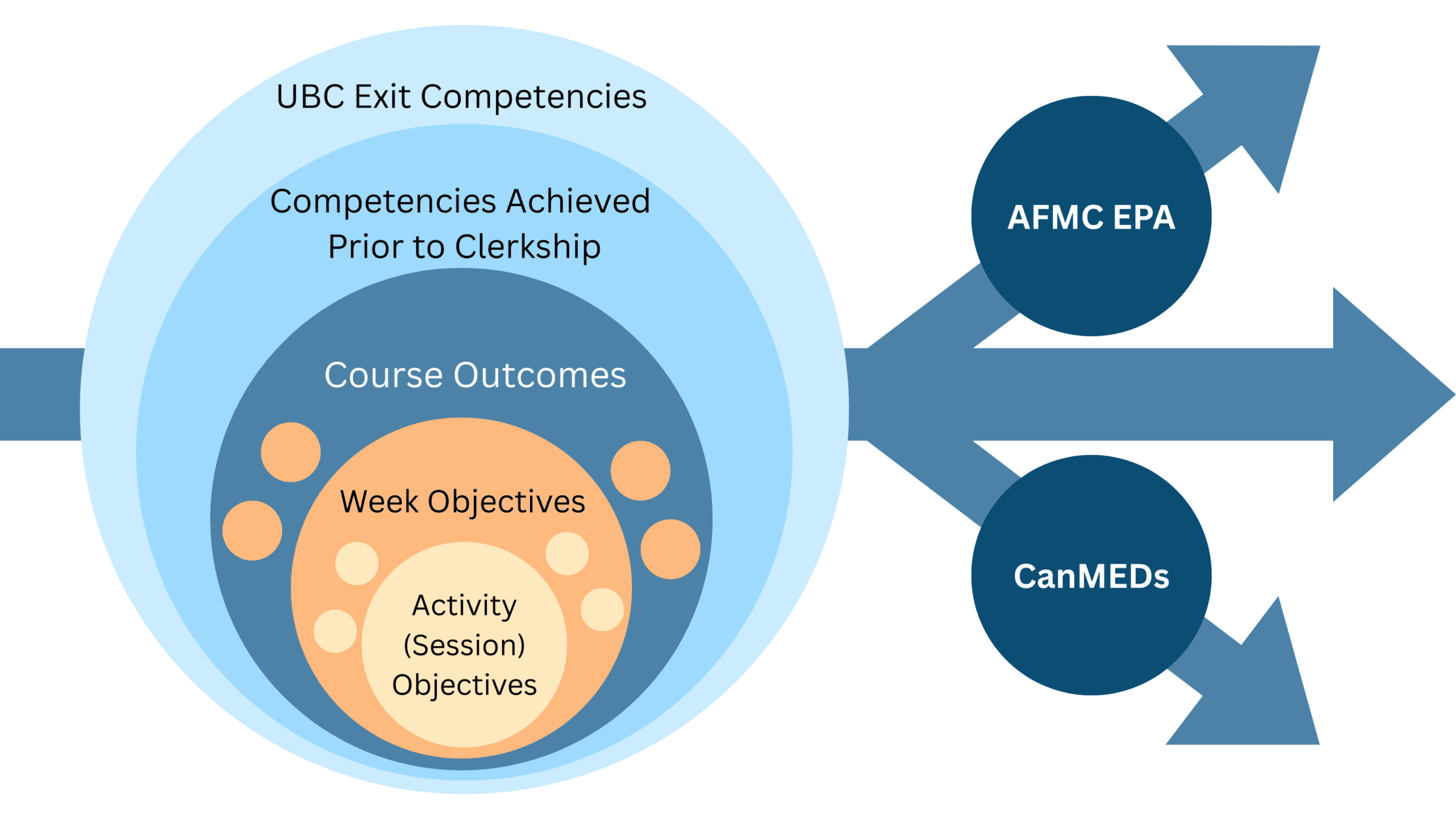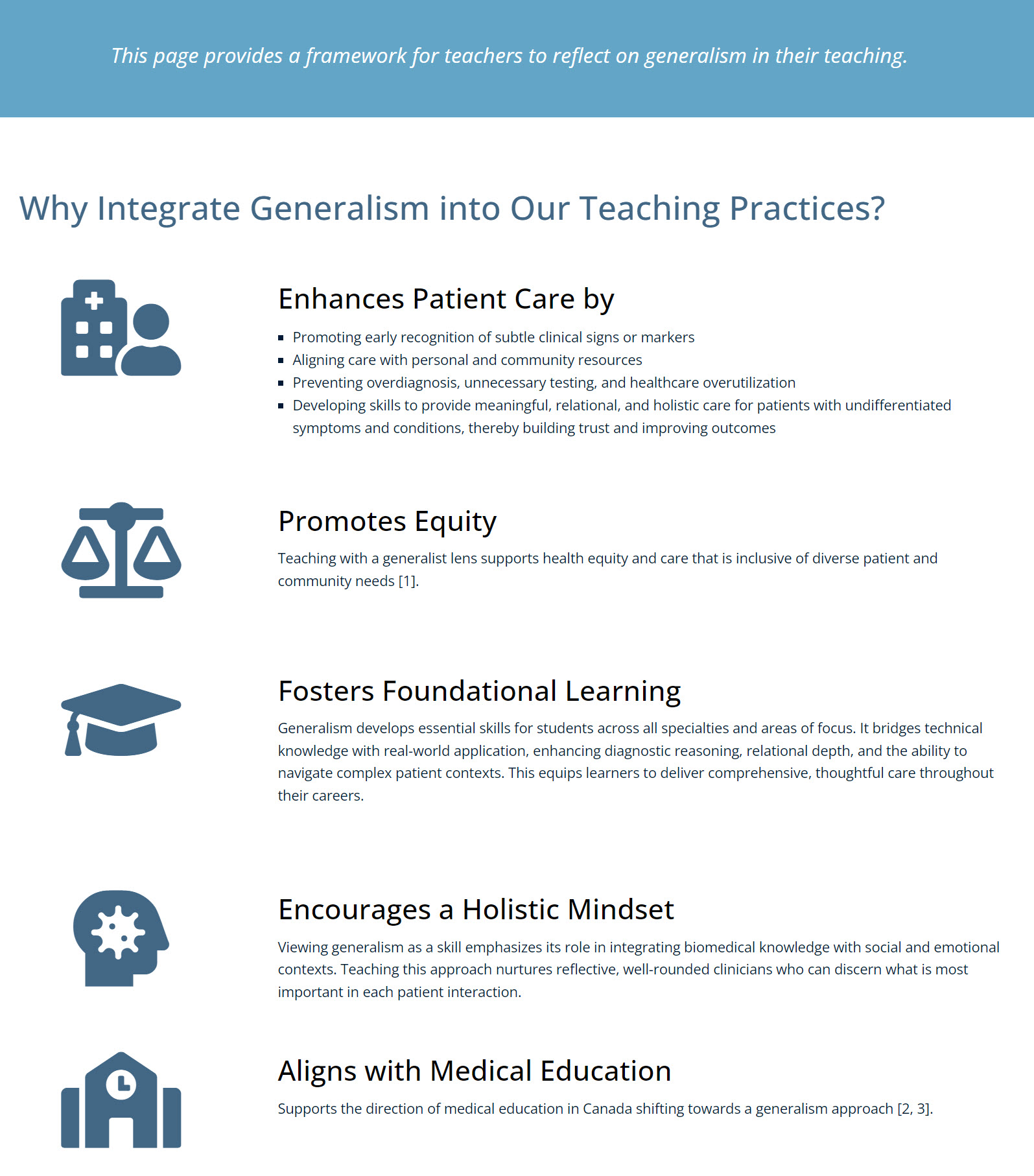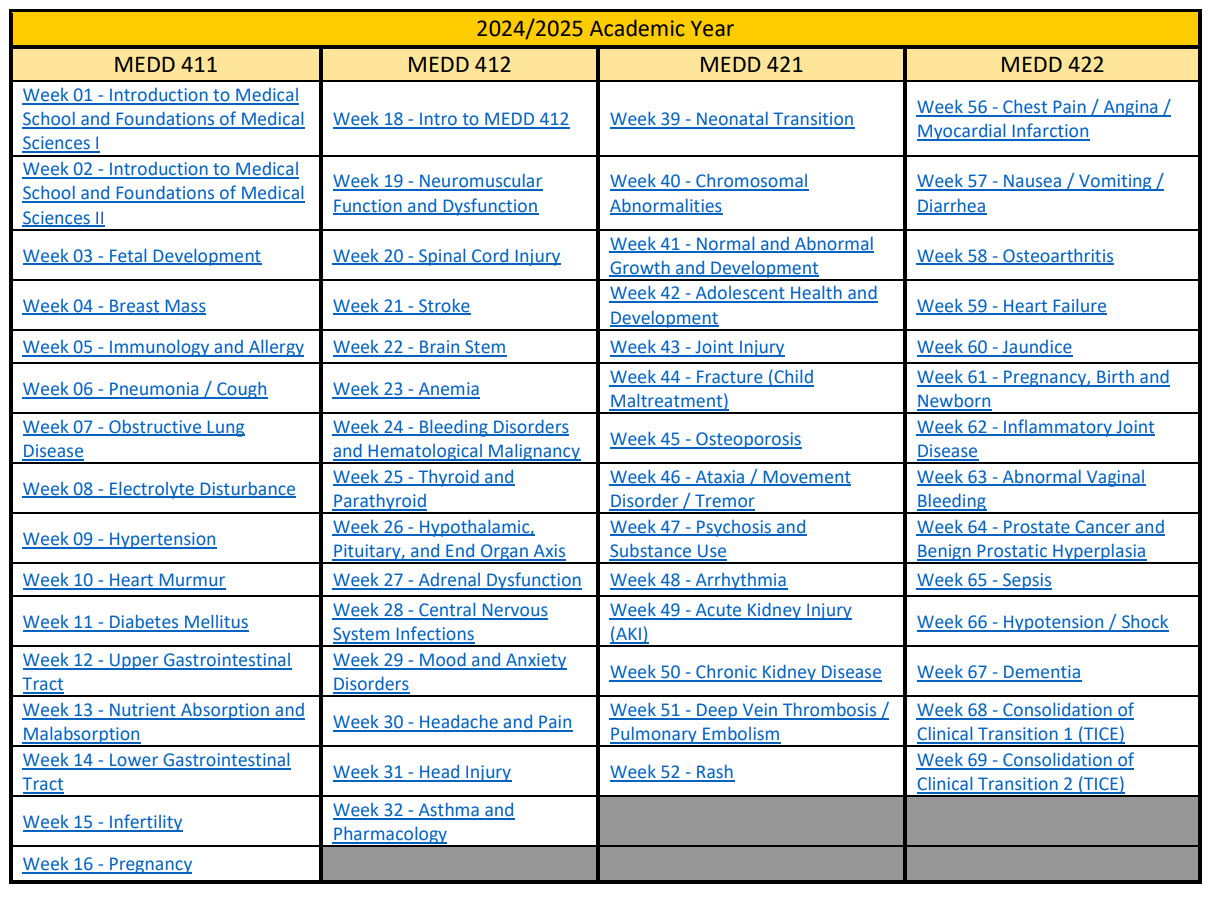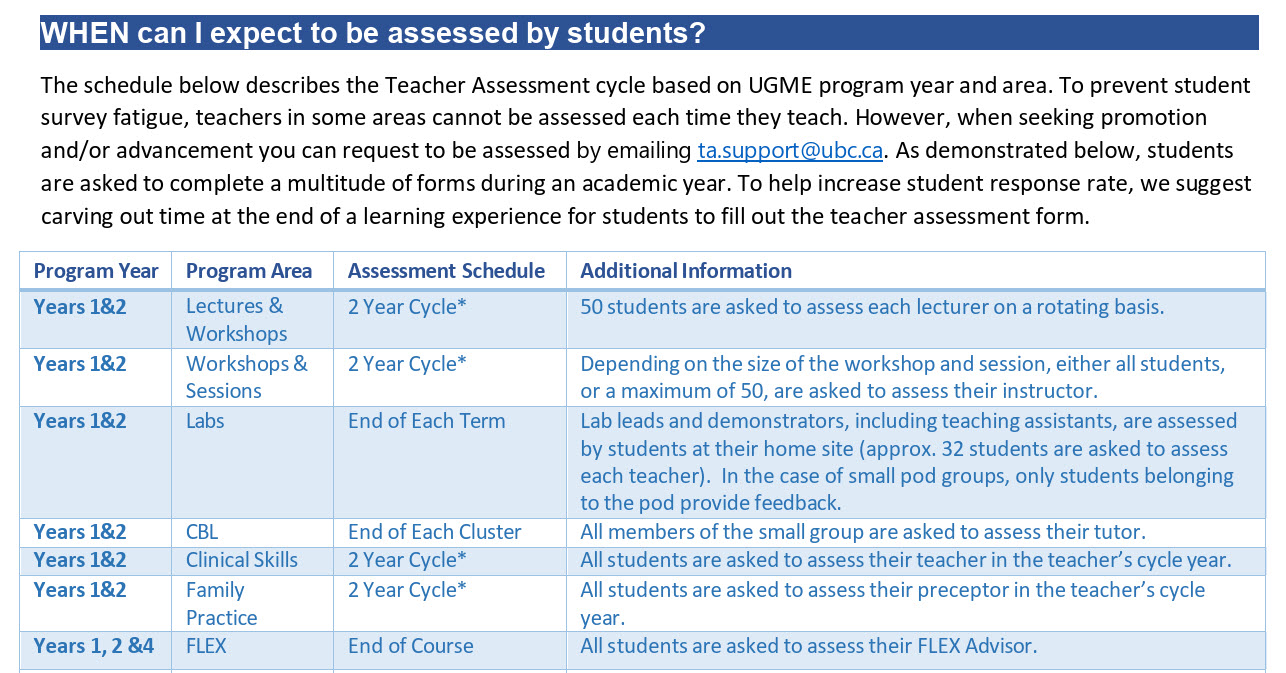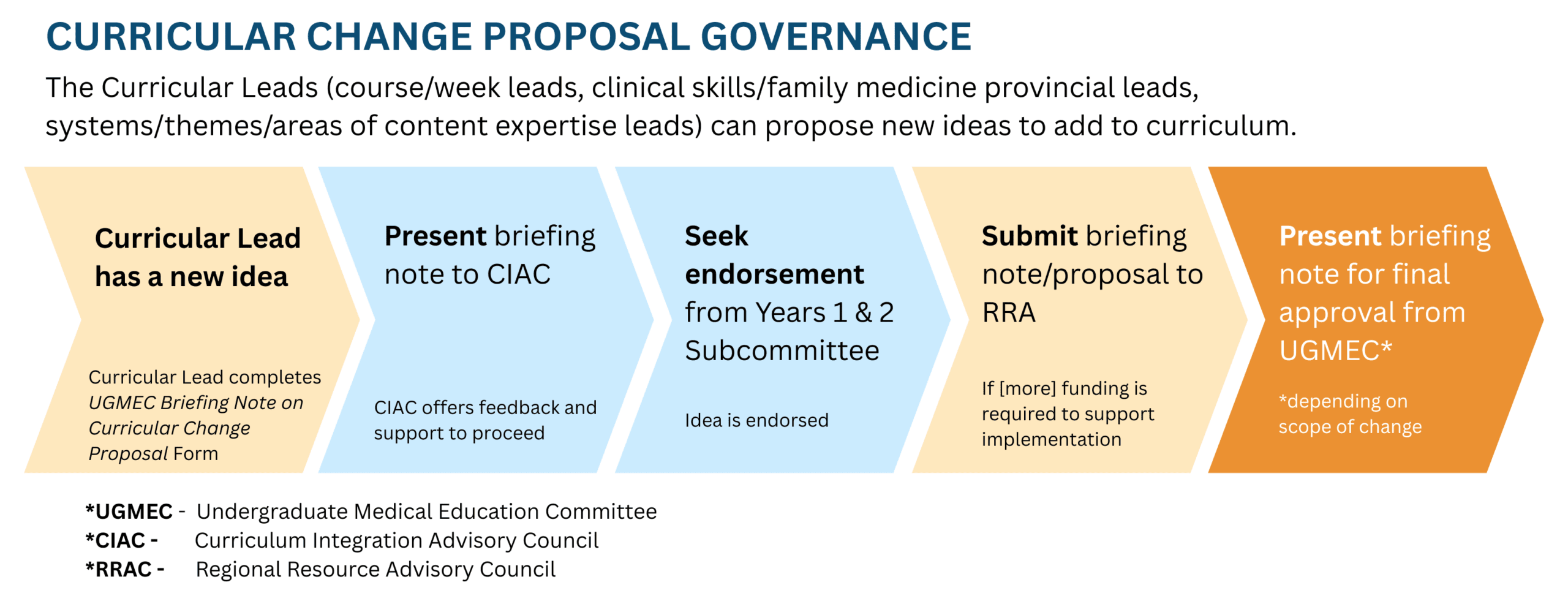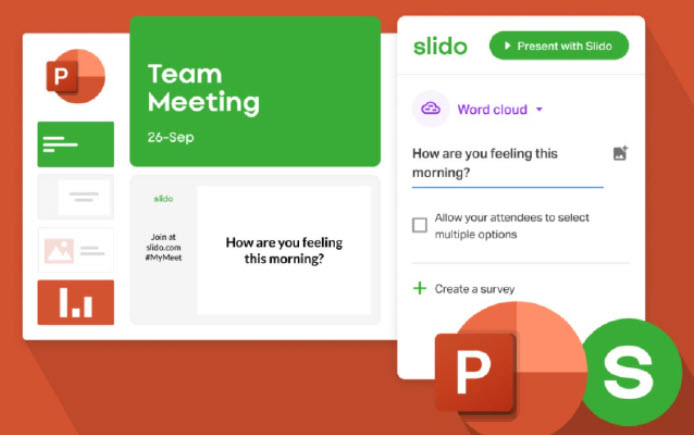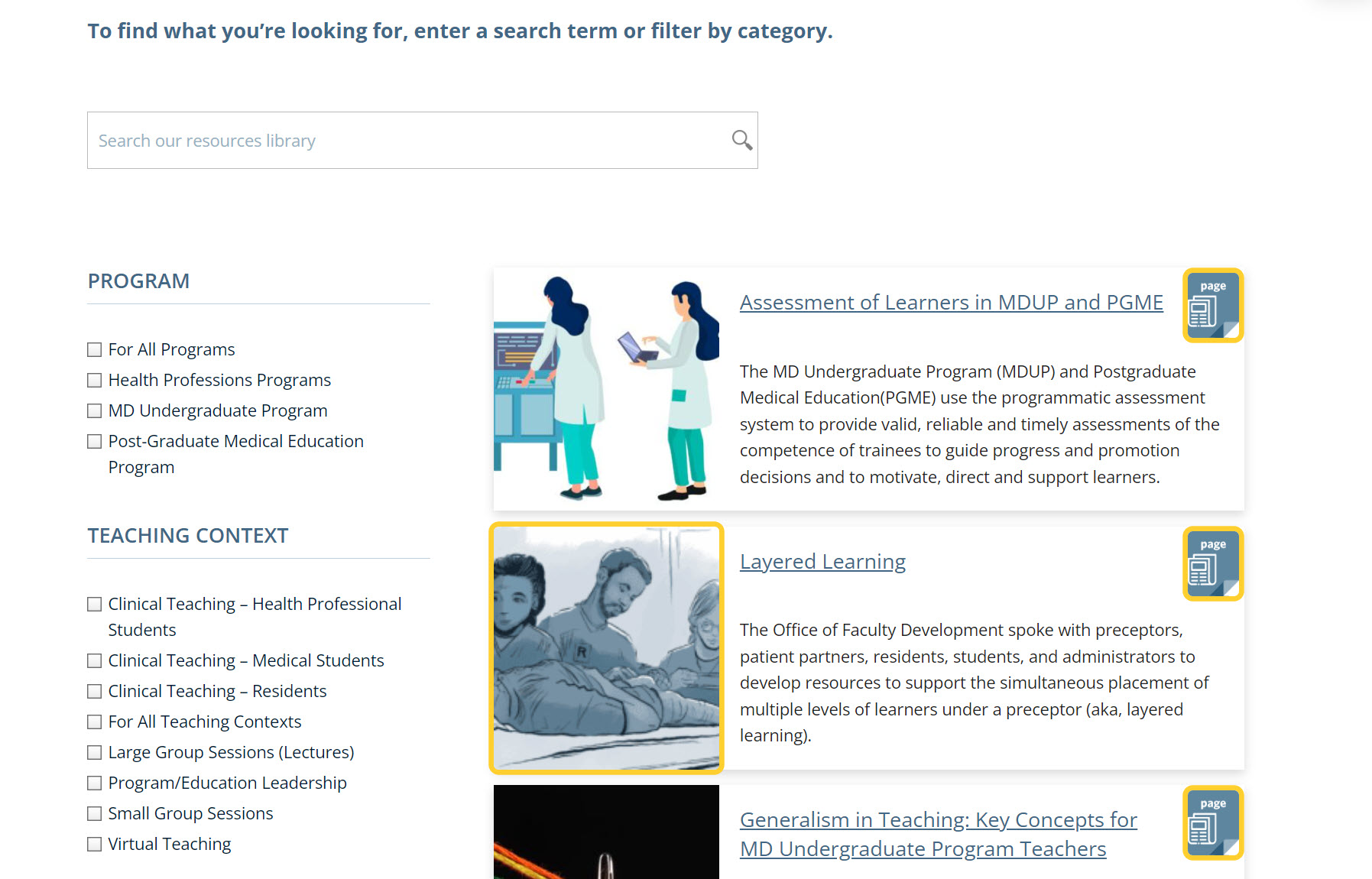Resources for Week Leads in Years 1 & 2 of the MD Undergraduate Program
This page has been designed for current or prospective Week Leads to find relevant information for successfully leading a week in the UBC MD Undergraduate Program (MDUP). You will find information on each of the main components of a typical week in Year 1 and 2.
The Week Lead Role
As a Week Lead, you are a critical link in ensuring that what is intended by the Session and Week Objectives is what is actually delivered and assessed within your curricular week.
Each curricular week within Years 1&2 focuses on a new clinical presentation and is supported by a Case-Based Learning (CBL) case, lectures, small group workshops, and labs.
In some weeks, there might be sessions that are part of a theme- or area of content expertise-based longitudinal curriculum such as Lifestyle Medicine, Indigenous Health, Anatomy, Genetics and Genomics, or Public Health Prevention and Control.
The MDUP curriculum depends on content being spiralled from Years 1-4, with seamless integration of systems, themes, and areas of content expertise. In other words, session objectives need to map to week objectives, and then to course outcomes and finally to the enabling competencies students are required to achieve prior to clerkship.
*AFMC – The Association of Faculties of Medicine of Canada
*EPA – Entrustable Professional Activities
*CanMEDS – Canadian Physician Competency Framework
This mapping is not only an important accreditation standard, but will also ensure our students conclude their undergraduate training with the intended knowledge, skills and behaviours.
To support this goal, as a Week Lead you will collaborate with the Course Director(s) and System/Theme/Areas of Content Expertise Leads to ensure the content covered in your week is appropriately situated within the System/Theme/Area of Content Expertise spiral and is mapped to course outcomes and the enabling competencies to achieve prior to Clerkship.
For a list and detailed description of the MDUP Systems/Themes/Areas of Content Expertise, you can read or download the document Systems & Themes Definitions.
For the a full position description of the Week Lead role, you can read or download Position Description – Week Lead – Years 1 and 2.
Teaching with a Generalism Lens
Generalism is the skill and philosophy of seeing the whole person in healthcare by integrating relational, contextual, and meaningful aspects of a patient’s life with their physical health. Integrating generalism as a teaching approach involves incorporating a broad scope of complex clinical scenarios, undifferentiated presentations, and care that is comprehensive.
Key principles of teaching with a generalism lens:
-
- Teach whole person care
- Forster strong doctor-patient relationships
- Prepare students for navigating complexity and uncertainty
- Promote prevention and coordination
- Foster inclusive and collaborative teaching
- Adapt, design and deliver content to promote respect of the scope and role of generalism
We recognize that you are likely already incorporating elements of generalism into your teaching and professional practice. While the term “generalism” provides a label, it exists as a range, with individuals engaging with it in varying ways and to different extents.
For more in depth information on teaching with a generalism lens, including how generalism principles can be integrated into a lecture setting, visit Faculty Development’s Generalism page.
Years 1 & 2 Week Planning Timeline
The various tasks and respective timelines involved in the planning of a Curricular Week in Years 1 and 2 are depicted in the figure below. Course Directors and the Course Administrative Team will reach out to Week Leads as needed to complete some of these tasks and when their input is required.
Specific Responsibilities at Each Phase
Planning Your Week
During planning of the week, you will be responsible for:
-
- Reviewing Week Objectives annually (In collaboration with Course Leads and System/Theme/Area of Content Expertise Leads) to ensure these are up-to-date, are appropriately situated within the System/Theme/Area of Content Expertise spiral across curricular years, and map to Course Outcomes and Enabling Competencies to achieve prior to Clerkship.
- Identifying appropriate lecturers and session leads for all sessions related to the Week’s topic (excludes longitudinal curriculum sessions).
- Liaising with lecturers and session leads in development and annual review of Education Activity Forms (EAFs) – i.e., session abstract and objectives – to minimize redundancies, ensure these are aligned with Week Objectives, and are appropriate to the level of training.
- Reviewing the CBL case annually to ensure it is up-to-date and addresses prior student and tutor feedback.
- Collaborating with the Provincial Learner Assessment Team (PLAT), Course Director, System/Theme/Area of Content Expertise Leads to create written examinations. Week leads are responsible for soliciting/creating and mapping multiple-choice questions (MCQs) for their Week’s exam bank, and selection of MCQs to assess the Week’s content to be included in formative quizzes and summative examination.
Timeline: Approximately 4 months prior to the start of the course.
Time commitment: 12 – 18 hours*
*This is an estimate for new Week Leads and is variable depending on experience.
Implementation of Your Week
During implementation of the week, you will be responsible for:
-
- Monitoring delivery and operations of the educational sessions during the week.
- Being available to interact with students and adress any questions or concerns (in-person, virtually, or via e-mail) throughout the week.
- Presenting the CBL case at the pre-case CBL tutor meeting, and receiving feedback and addressing concerns from CBL tutors.
Time commitment: 10 hours*
*This is an estimate for new week leads and is variable depending on experience.
Post Implementation of Your Week
Post-implementation of the week, you will be responsible for:
-
- Reviewing the MCQ examination results/statistics and help with any scoring or re-scoring decisions.
- Addressing continuous quality improvement recommendations in collaboration with the Course Director, particularly regarding lectures which may have raised concerns due to a misalignment with Session and/or Week Objectives, excess of content, and/or content beyond the scope of year-level expectations.
Time commitment: 2 hours*
*This is an estimate for new week leads and is variable depending on experience.
Weekly Topics
This chart provides an overview of all weekly topics in MEDD 411, MEDD 412, MEDD 421 and MEDD 422.
If you want more detailed information about how session content fits within the course and the week curriculum, you can:
-
- Download the following PDF to see the curricular weeks linked to a summary of that week’s objectives: Year 1 and 2 Curricular Weeks and Week Objectives
- Explore the detailed learning objectives for your (or any) session and how they are linked to the week objectives on Entrada
Educational Activity Forms – EAFs
The Educational Activity Form (EAF) is the tool the Faculty of Medicine uses to collect accurate curricular information for each session of the MD Undergraduate Program. There is an EAF for each session of the program and each form is pre-populated with the curricular content from last academic year. The EAF workflow helps to satisfy Committee on Accreditation of Canadian Medical Schools (CACMS) Accreditation Standards 6 and 8 (see CACMS Standards and Elements).
-
- Read the Educational Activity Forms (EAF) – Frequently Asked Questions from the Curriculum Management Unit.
- For an explanation / instruction for each field of an EAF, read the guide Educational Activity Form Field Meanings and Notes
Assessment Resources
Writing Multiple Choice Questions (MCQ)
Faculty (lecturers and session leads) are asked to create 2-3 Multiple-Choice Questions (MCQs) that map to the Objectives covered in their lecture/session, are appropriate to the level of learning of the students, and are embedded in generalism principles. Week Leads are also responsible for soliciting/creating and mapping MCQs for their Week’s exam bank, and selection of MCQs to assess the Week’s content to be included in formative quizzes and summative examination.
Teacher Assessment
Through a more formal process, medical students provide feedback to teachers at the end of a required learning experience, such after a lecture or a cluster of small group sessions. To limit student survey burden, teachers won’t be assessed each time they teach.
Learn more about how teachers are assessed.
Downlaod the PDF: Assessment of Teacher by Student FAQ Info sheet for Faculty and Teachers
*This resource includes an outline of when teachers will be assessed by students.
Curriculum Change Proposals
Curriculum Leads (including Week Leads) can propose changes/additions to the existing curriculum. If such proposals involve a change to the current Week Objectives (e.g., creation of a new session/lecture), such proposal will need to be presented to Curriculum Leadership for feedback and endorsement prior to implementation.
The flowchart below depicts the steps and committees involved in the approval of new curricular initiatives. For more information on how to initiate this process, Week Leads can reach out to their respective Course Director and/or the Associate Director of Curriculum, Years 1&2.
Proposals Requiring UGMEC Approval
Certain curricular changes require approval by the Undergraduate Medical Education Committee (UGMEC). These changes include:
-
- Changes that are considered a major modification according to Year-level subcommittees, Curricular Integration Advisory Council or UGMEC.
- Changes that require submission of a notification to the Committee on Accreditation of Canadian Medical Schools (CACMS)
- Changes to the MD Program Exit and/or Enabling Competencies
- The introduction of new curricula/requirements
- Substantive changes to or the removal of existing curricula/requirements
- Significant changes to the content, objectives, delivery, assessment and/or evaluation of individual courses, components, themes or other discrete curricular elements
If you think your proposal may require UGMEC approval, please contact your Course Director and the Associate Director of Curriculum, Years 1&2
Proposals Requiring RRAC Approval
Curricular proposals with fiscal, human resource, or technological implications across will need to be approved by the Regional & Resource Advisory Council (RRAC) prior to implementation.
If you think your proposal may require RRAC approval, please contact your Course Director and the Associate Director of Curriculum, Years 1&2
Teaching Resources
Resources for Lecturers
This page contains a comprehensive set of resources developed in association with UBC Faculty of Medicine lecturers to support the design and delivery of effective and engaging sessions. Includes links to:
-
- Design and Deliver Effective Lectures module
- Key materials and resources
- Teaching & technical support
Design and Deliver Effective Lectures
This module outlines time management, content organization, understanding the curriculum, slide design, learner engagement, and inclusive language and visuals. Information in this module is based on relevant literature on teaching principles, teacher assessment data, and interviews with medical students, experienced lecturers, and course leadership.
This module is accredited for 1.0 MOC Self-Assessment Program (Section 3) and Mainpro+ credits.
Audience Response Sytems – Slido
This website and PowerPoint plugin is an easy-to-use Q&A and polling platform for live, remote or hybrid learning events. Students participate by simply connecting to the Slido (pronounced as Sly-doe) website using an event code or QR code to access. Consider incorporating strategies to engage and encourage student participation and case-based presentations in your lecture.
Visit the EdTech Slido User Guide to learn more or to get assistance with integrating Slido into your lecture.
Office of Faculty Development Teaching Resources
This page contains resources developed and compiled by the Office of Faculty Development. It is a searchable catalogue that gives faculty access to curated resource collections, role-based modules, workshop and Academic Half Day slide decks, session recordings and other supports.
You can search by program, teaching context, popular topics or by key word.
